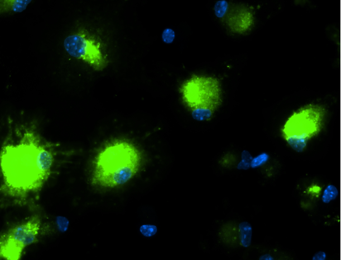Dr. Yanlin Wang, professor and chief of nephrology at UConn Health, is recipient of the U.S. Department of Veterans Affairs Senior Clinician Scientist Investigator (SCSI) Award.
The SCSI award prestigiously recognizes Wang as an outstanding clinician scientist engaged in ongoing VA research for kidney disorders while continuously providing high quality and timely clinical care to Veterans.
Wang is currently researching novel therapeutic targets for chronic kidney disease. His newly funded grant, a third consecutive renewal of a VA Merit award since 2014, will study the role of exosomal DNA-cGAS signaling in the development of chronic kidney disease. This SCSI award will allow for Wang’s VA Merit grant extension for an additional four years (now totaling 8 years) and will expand his laboratory’s explorations in transformative advances in the field of nephrology.
Wang stresses that chronic kidney disease is a public health threat and that we need more research into the clinical condition.

“Chronic kidney disease affects more than 37 million Americans and is a leading cause of mortality among our civilians and Veterans. In fact, the prevalence of the disease in our Veteran population is 34% higher than other Americans,” says Wang.
Wang has been studying the mechanisms of chronic kidney disease. The disease’s culprit is injury to the kidney’s tubular epithelial cells which causes chronic inflammation which can lead to atrophy, the wasting away of the organ, and fibrosis or scarring.
This UConn Health physician-scientist is working to better understand this chronic inflammation.
“There is a critical knowledge gap in the molecular mechanisms of kidney inflammation. Therefore, a better understanding of the molecular mechanisms that drive kidney inflammation is essential for developing effective strategies for the treatment of chronic kidney disease,” stresses Wang.
Wang and his team’s past VA research study findings have shown how inflammatory cells are recruited into the kidney during the disease’s development and the specific disrupting roles played by both chemokine CXCL16 and histone deacetylase 3.
“In our next research studies we plan to examine and characterize the specific role of macrophages to further understand the cellular and molecular mechanisms of chronic kidney disease in an experimental model of hypertension,” says Wang who plans to utilize molecular, genetic, biochemical, and pharmacological approaches to study the specific role of exosomal DNA-cGAS signaling in macrophage activation in hypertensive kidney disease.
Wang concludes, “Results from our studies will provide new understandings of the molecular mechanisms of kidney inflammation and fibrosis and could lead to development of novel therapeutic strategies for the treatment of chronic kidney disease.”
In addition to serving as chief of the Division of Nephrology at UConn School of Medicine, Wang is co-director of the MD/Ph.D. Program and medical director of the UConn Dialysis Center. Wang is a fellow of the American Society of Nephrology and member of the American Physiological Society.



